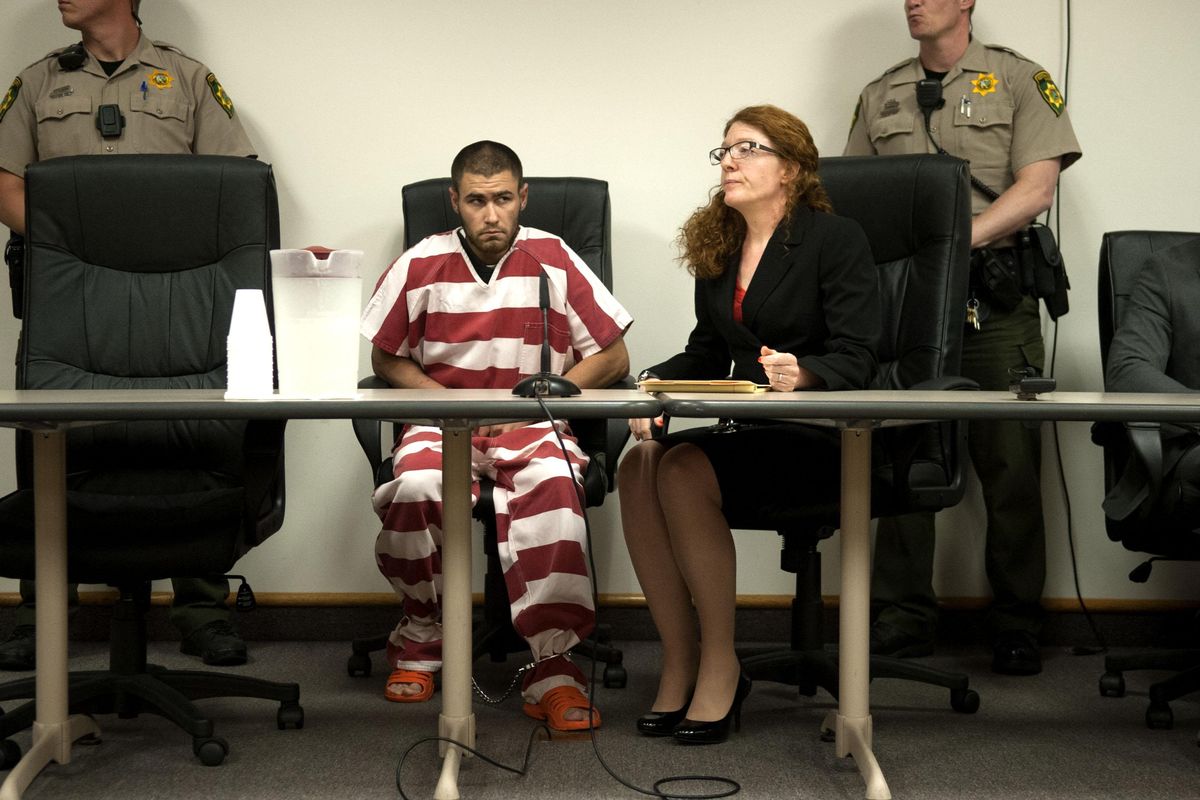Trial for accused cop killer Jonathan Renfro opens in Coeur d’Alene

It was the kind of crime that a community remembers forever: Following reports of burglaries, a 16-year veteran Coeur d’Alene Police officer enters an area of the Lake City after midnight. The officer encounters an armed man and is shot in the head.
Sgt. Greg Moore died several hours later on May 5, 2015, after medical efforts to save him ended. He was later awarded the Idaho Medal of Honor in a ceremony that included his son and father.
Today, Kootenai County officials will gather scores of residents to the courthouse to begin the selection of a jury, who will decide the fate of Jonathan D. Renfro, 29, charged with first-degree murder and several other charges in connection to Moore’s death.
The jury’s task could come in two stages. If it eventually decides during a trial – which could include more than 100 witnesses and dozens of experts – that Renfro is guilty of first-degree murder, it would then be asked in a separate hearing whether the defendant should also face the death penalty.
The case will be prosecuted by Kootenai County Prosecutor Barry McHugh and deputies David Robins and Jed Whitaker. The defense includes Twin Falls attorney Keith Roark, who was appointed to represent Renfro along with Deputy Kootenai County Public Defenders Jay Logsdon and Linda Payne.
First District Judge Lansing Haynes, himself a former Kootenai County deputy prosecutor, has issued a gag order that prevents the attorneys from commenting on the case.
But last year, prosecutors alleged in a written motion that Renfro not only admitted his involvement in the shooting but predicted he may have been targeting police. The motion was filed last year to bolster the state’s case for aggravating factors that may be used in its effort to seek the death penalty.
Prosecutors claimed, in the motion, that Renfro showed his girlfriend the gun that was later determined to be the one that killed Moore. Renfro, who was on felony parole at the time, displayed the gun a the day before the deadly encounter.
“The defendant boasted that a bullet within the magazine was a ‘cop killer’ bullet,” the motion states, according to court records. “When asked about what he would do if stopped by law enforcement, the defendant claimed he would go down murdering police officers.”
The motion also claims that while in jail, Renfro has laughed about committing certain aspects of the crime during phone conversations.
Renfro “has justified his actions as being noble – claiming that cops will now think twice before being aggressive with individuals,” the motion read.
Shortly after he was arrested, Renfro told detecitves that on Sept. 5 he went looking for a car to steal and “to collect money on behalf of white supremacists from Native Americans.”
In a two-hour interview with investigators, Renfro first denied shooting Moore and blamed the crime on someone named Davis. Renfro changed his story and admitted to shooting Moore when a detective informed him that the incident had been captured on Moore’s body camera.
When a detective asked Renfro why he shot Moore, the suspect replied, “Fear,” according to a transcript of the police interview that was read in court.
“Fear of what?” the detectives asked him. “Having a gun in my damn pocket,” Renfro answered, according to court testimony.
Moore apparently stopped to question Renfro after seeing him, dressed in dark clothing, walking down a sidewalk on Wilbur Avenue in a residential neighborhood a little before 1:30 a.m.
One of the detectives, during the court hearing in 2015, also asked Renfro how Moore had treated him during the encounter. Renfro said he found Moore to be a “really nice man,” according to the transcript read in court in August 2015.
Former Public Defender John Adams questioned Idaho State Police Detective Michael Van Leuven, the lead investigator in the case, during the preliminary hearing in 2015.
Adams asked Van Leuven if Renfro told detectives he shot Moore because the officer had placed his hand on his service pistol. Van Leuven said yes, but he didn’t recall the exact words Renfro used.
According to the interview transcript, Renfro told detectives, “If my intent was to shoot him, I would have shot him before I gave him my ID.”
Renfro continued: “I was feeling scared, trapped and concerned,” and as soon as he saw Moore place a hand on his gun, “I didn’t think,” and just reacted, according to the transcript read in court.
Prosecutors earlier had asked Judge Haynes to move the case to Boise in an effort to find jurors who had not heard about the case, but Haynes refused.
“This court specifically finds that the bulk of publicity in this case, as presented by Renfro, consists of accurate representations of the allegations leading to the charges against Renfro, and accurate representations of the various procedural stages of the case,” Haynes wrote in his decision last June.
The Associated Press contributed to this report.